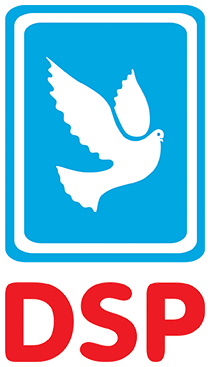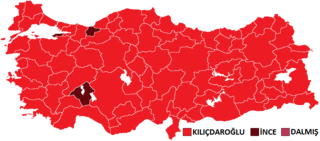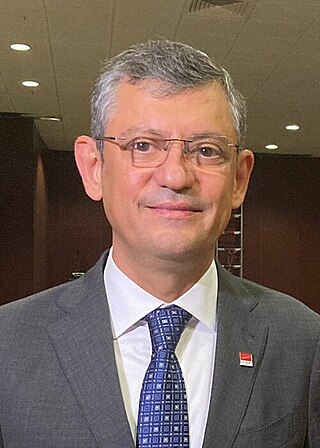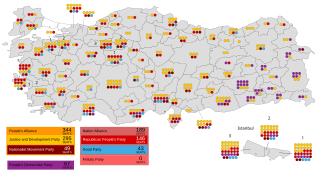
The Republican People's Party is a Kemalist and social democratic political party in Turkey. It is the oldest political party in Turkey, founded by Mustafa Kemal Atatürk, the first president and founder of the modern Republic of Türkiye. The party is also cited as the founding party of modern Turkey. Its logo consists of the Six Arrows, which represent the foundational principles of Kemalism: republicanism, reformism, laicism (Laïcité/Secularism), populism, nationalism, and statism. It is currently the second largest party in Grand National Assembly with 130 MPs, behind the ruling conservative Justice and Development Party.

The Democratic Left Party is a Turkish political party, founded on 14 November 1985 by Rahşan Ecevit.

Devlet Bahçeli is a Turkish politician, economist, former deputy prime minister, and current chairman of the far-right, ultranationalist Nationalist Movement Party (MHP).

Kemal Kılıçdaroğlu is a Turkish politician who served as the leader of the Republican People's Party (CHP) from 2010 to 2023. He was Leader of the Main Opposition in Turkey between 2010 and 2023. He served as a member of parliament for Istanbul's second electoral district from 2002 to 2015, and as an MP for İzmir's second electoral district from 2015 to 2023.

Muharrem İnce is a Turkish physics teacher, school principal, sport executive, and politician. He is the founder and the incumbent leader of the Homeland Party since May 2021. Formerly a four term Republican People's Party MP for Yalova, his hometown, he also served as the CHP's parliamentary group deputy chairman between June 2010 and August 2014.

The 18th Republican People's Party Extraordinary Convention took place on 5 and 6 September 2014 in order to elect a leader of the Republican People's Party, a Turkish centre-left political party. Initially, an ordinary convention was due to be held in 2014, two years after the previous one in 2012. However, the party's incumbent leader Kemal Kılıçdaroğlu accepted calls for an extraordinary convention to be held following the loss of the CHP's presidential candidate Ekmeleddin İhsanoğlu in the presidential election held in August. The ordinary convention will thus be held in 2015 instead.

The 2014 Extraordinary Congress of the Justice and Development Party was held on 27 August 2014 in order to elect a new leader of the Justice and Development Party, the ruling political party of Turkey. It was the first extraordinary congress in the party's history, necessitated by the election of party leader Recep Tayyip Erdoğan as the 12th President of Turkey. Former Foreign Minister and Konya MP Ahmet Davutoğlu was unanimously elected unopposed as party leader. The congress marked the last public appearance of Recep Tayyip Erdoğan as Prime Minister, as he assumed the Presidency the day after. The congress took place at a time of significant change to Turkish politics, with the opposition Republican People's Party also holding an extraordinary convention on 5–6 September.
The 13th Extraordinary Convention of the Republican People's Party was held on 29 and 30 January 2005 in order to elect a leader for the Republican People's Party (CHP), a Turkish centre-left political party. Incumbent leader Deniz Baykal was challenged by the Mayor of Şişli, Mustafa Sarıgül for the leadership. The convention was marred by violence between supporters of the two rivals, who had accused each other of corruption and elitism during their speeches. The final result was a victory for Baykal, who won 59.4% of the delegates' votes against Sarıgül's 40.6%.

The 33rd Republican People's Party Ordinary Convention was held on 22 and 23 May 2010 in order to elect a new leader following the resignation of Deniz Baykal after a sex-tape scandal. The only candidate was former CHP parliamentary group leader Kemal Kılıçdaroğlu, who was both nominated and unanimously elected with a record share of the delegates' votes.
The 15th Extraordinary Convention of the Republican People's Party was held on 18 December 2010 to elect all 80 members of the Party Council of the Republican People's Party (CHP) of Turkey. It was the first Extraordinary Convention held by party leader Kemal Kılıçdaroğlu, who was elected as the party's leader in May 2010.

Levent Gök is a Turkish politician from the Republican People's Party (CHP) who currently serves as one of the three parliamentary group leaders for his party since 22 August 2014. He succeeded Muharrem İnce, who resigned to contest the 18th CHP Extraordinary Convention as a leadership candidate. He has been a Member of Parliament for Ankara's first electoral district since the 2011 general election.

Özgür Özel is a Turkish pharmacist and politician who serves as the leader of the Republican People's Party (CHP). He had shared the parliamentary deputy group leadership of the CHP with Engin Altay and Levent Gök between the years 2015 and 2023. He has been an MP for the electoral district of Manisa since the 2011 general election and is well known for his activism concerning the rights of miners in Manisa Province.
The 2016 Nationalist Movement Party Extraordinary Congresses referred to two party conventions of the Turkish Nationalist Movement Party (MHP), the first of which was held on 19 June 2016, in order to vote on proposed changes to the MHP party constitution and elect a new leader. The congress was initially intended to be held on 15 May 2016 after enough delegates submitted the required signatures, however it was delayed after judiciary conflicts between different courts. After the final decision by Court of Cassation allowing the congress to go ahead, the party executive announced that an extraordinary congress with a leadership election would be held on 10 July while the invitation committee formed by the court declared that the constitutional extraordinary congress would occur on 19 June 2016. Although the MHP executive declared the congress to be against the MHP constitution and legally flawed, the first Congress was held as planned by the inner-party opposition, with a unanimous vote to change the constitution being achieved. The second congress was delayed after judiciary intervention requested by MHP officials, along with a formal request from the Supreme Electoral Council (YSK). The congress was eventually not held, prompting the dissidents to resign and join forces under a new party, namely the Good Party.

A constitutional referendum was held in Turkey on 16 April 2017 on whether to approve 18 proposed amendments to the Turkish constitution that were brought forward by the governing Justice and Development Party (AKP) and the Nationalist Movement Party (MHP). As a result of its approval, the office of Prime Minister was abolished and the existing parliamentary system of government was replaced with an executive presidency and a presidential system. The number of seats in Parliament was raised from 550 to 600, while, among a series of other proposals, the president was given more control over appointments to the Supreme Board of Judges and Prosecutors (HSYK). The referendum was held under a state of emergency that was declared following the failed military coup attempt in July 2016.
The 2017 Turkish constitutional referendum 'No' campaign refers to a collection of unsuccessful political campaigns led by political parties, organizations and media outlets in favour of a 'No' vote in the 2017 Turkish constitutional referendum. Were the campaign to have been successful, it would have resulted in Turkey remaining a parliamentary republic as opposed to an executive presidency, which it became as a result of the referendum, and would have constituted the first direct upset against the governing Justice and Development Party (AKP) since they took office in 2002.

The Good Party is a nationalist, Kemalist and conservative political party in Turkey, established on 25 October 2017 by Meral Akşener. The party's name and flag is a reference to the tamga of the Kayı tribe.
The 36th Republican People's Party Ordinary Convention was an election scheduled to take place on 3 and 4 February 2018. During the convention, several high-ranking positions in the Republican People's Party (CHP), the centre-left main opposition party in Turkey, were up for election. The party leadership of Kemal Kılıçdaroğlu, who first won the position in 2010, was challenged by several other party members, notably including former CHP parliamentary group leader Muharrem İnce, and former president of the Istanbul Bar Association, Ümit Kocasakal.

Parliamentary elections were held in Turkey on 24 June 2018 as part of general elections, with presidential elections taking place on the same day. Originally scheduled for 27 October 2019, President Recep Tayyip Erdoğan called snap elections on 18 April after months of speculation. With the passage of a series of constitutional amendments in the 2017 referendum, the number of MPs will be increased from the previous 550 to 600. These representatives will be elected by the constituents of the 87 electoral districts of Turkey by party-list proportional representation.
The 12th Nationalist Movement Party Ordinary Congress was a political party convention held by the Turkish right-wing Nationalist Movement Party (MHP) on 18 March 2018. The Congress resulted in the re-election of Devlet Bahçeli as party leader, having been the only candidate.
The Felicity and Future Alliance was a Turkish political alliance between the Felicity Party (SP) and the Future Party (GP) established on 6 July 2023, which includes the establishment of a joint group in the Grand National Assembly of Turkey (TBMM) and cooperation in the elections.












